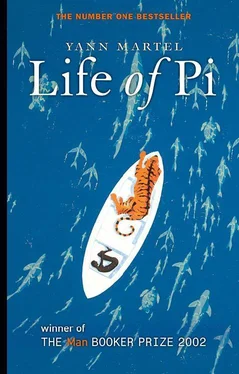My parents, the pandit and the imam looked surprised.
“You must be mistaken. He’s a good Muslim boy. He comes without fail to Friday prayer, and his knowledge of the Holy Qur’an is coming along nicely.” So said the imam.
My parents, the priest and the pandit looked incredulous.
The pandit spoke. “You’re both wrong. He’s a good Hindu boy. I see him all the time at the temple coming for darshan and performing puja.”
My parents, the imam and the priest looked astounded.
“There is no mistake,” said the priest. “I know this boy. He is Piscine Molitor Patel and he’s a Christian.”
“I know him too, and I tell you he’s a Muslim,” asserted the imam.
“Nonsense!” cried the pandit. “Piscine was born a Hindu, lives a Hindu and will die a Hindu!”
The three wise men stared at each other, breathless and disbelieving.
Lord, avert their eyes from me, I whispered in my soul.
All eyes fell upon me.
“Piscine, can this be true?” asked the imam earnestly. “Hindus and Christians are idolaters. They have many gods.”
“And Muslims have many wives,” responded the pandit.
The priest looked askance at both of them. “Piscine,” he nearly whispered, “there is salvation only in Jesus.”
“Balderdash! Christians know nothing about religion,” said the pandit.
“They strayed long ago from God’s path,” said the imam.
“Where’s God in your religion?” snapped the priest. “You don’t have a single miracle to show for it. What kind of religion is that, without miracles?”
“It isn’t a circus with dead people jumping out of tombs all the time, that’s what! We Muslims stick to the essential miracle of existence. Birds flying, rain falling, crops growing—these are miracles enough for us.”
“Feathers and rain are all very nice, but we like to know that God is truly with us.”
“Is that so? Well, a whole lot of good it did God to be with you—you tried to kill him! You banged him to a cross with great big nails. Is that a civilized way to treat a prophet? The prophet Muhammad—peace be upon him—brought us the word of God without any undignified nonsense and died at a ripe old age.”
“The word of God? To that illiterate merchant of yours in the middle of the desert? Those were drooling epileptic fits brought on by the swaying of his camel, not divine revelation. That, or the sun frying his brains!”
“If the Prophet—p.b.u.h.—were alive, he would have choice words for you,” replied the imam, with narrowed eyes.
“Well, he’s not! Christ is alive, while your old ‘p.b.u.h.’ is dead, dead, dead!”
The pandit interrupted them quietly. In Tamil he said, “The real question is, why is Piscine dallying with these foreign religions?”
The eyes of the priest and the imam properly popped out of their heads. They were both native Tamils.
“God is universal,” spluttered the priest.
The imam nodded strong approval. “There is only one God.”
“And with their one god Muslims are always causing troubles and provoking riots. The proof of how bad Islam is, is how uncivilized Muslims are,” pronounced the pandit.
“Says the slave-driver of the caste system,” huffed the imam. “Hindus enslave people and worship dressed-up dolls.”
“They are golden calf lovers. They kneel before cows,” the priest chimed in.
“While Christians kneel before a white man! They are the flunkies of a foreign god. They are the nightmare of all non-white people.”
“And they eat pigs and are cannibals,” added the imam for good measure.
“What it comes down to,” the priest put out with cool rage, “is whether Piscine wants real religion—or myths from a cartoon strip.”
“God—or idols,” intoned the imam gravely.
“Our gods—or colonial gods,” hissed the pandit.
It was hard to tell whose face was more inflamed. It looked as if they might come to blows.
Father raised his hands. “Gentlemen, gentlemen, please!” he interjected. “I would like to remind you there is freedom of practice in this country.”
Three apoplectic faces turned to him.
“Yes! Prac tice —singular!” the wise men screamed in unison. Three index fingers, like punctuation marks, jumped to attention in the air to emphasize their point.
They were not pleased at the unintended choral effect or the spontaneous unity of their gestures. Their fingers came down quickly, and they sighed and groaned each on his own. Father and Mother stared on, at a loss for words.
The pandit spoke first. “Mr. Patel, Piscine’s piety is admirable. In these troubled times it’s good to see a boy so keen on God. We all agree on that.” The imam and the priest nodded. “But he can’t be a Hindu, a Christian and a Muslim. It’s impossible. He must choose.”
“I don’t think it’s a crime, but I suppose you’re right,” Father replied.
The three murmured agreement and looked heavenward, as did Father, whence they felt the decision must come. Mother looked at me.
A silence fell heavily on my shoulders.
“Hmmm, Piscine?” Mother nudged me. “How do you feel about the question?”
“Bapu Gandhi said, ‘All religions are true.’ I just want to love God,” I blurted out, and looked down, red in the face.
My embarrassment was contagious. No one said anything. It happened that we were not far from the statue of Gandhi on the esplanade. Stick in hand, an impish smile on his lips, a twinkle in his eyes, the Mahatma walked. I fancy that he heard our conversation, but that he paid even greater attention to my heart. Father cleared his throat and said in a half-voice, “I suppose that’s what we’re all trying to do—love God.”
I thought it very funny that he should say that, he who hadn’t stepped into a temple with a serious intent since I had had the faculty of memory. But it seemed to do the trick. You can’t reprimand a boy for wanting to love God. The three wise men pulled away with stiff, grudging smiles on their faces.
Father looked at me for a second, as if to speak, then thought better, said, “Ice cream, anyone?” and headed for the closest ice cream wallah before we could answer. Mother gazed at me a little longer, with an expression that was both tender and perplexed.
That was my introduction to interfaith dialogue. Father bought three ice cream sandwiches. We ate them in unusual silence as we continued on our Sunday walk.
Ravi had a field day of it when he found out.
“So, Swami Jesus, will you go on the hajj this year?” he said, bringing the palms of his hands together in front of his face in a reverent namaskar. “Does Mecca beckon?” He crossed himself. “Or will it be to Rome for your coronation as the next Pope Pius?” He drew in the air a Greek letter, making clear the spelling of his mockery. “Have you found time yet to get the end of your pecker cut off and become a Jew? At the rate you’re going, if you go to temple on Thursday, mosque on Friday, synagogue on Saturday and church on Sunday, you only need to convert to three more religions to be on holiday for the rest of your life.”
And other lampoonery of such kind.
And that wasn’t the end of it. There are always those who take it upon themselves to defend God, as if Ultimate Reality, as if the sustaining frame of existence, were something weak and helpless. These people walk by a widow deformed by leprosy begging for a few paise, walk by children dressed in rags living in the street, and they think, “Business as usual.” But if they perceive a slight against God, it is a different story. Their faces go red, their chests heave mightily, they sputter angry words. The degree of their indignation is astonishing. Their resolve is frightening.
Читать дальше












